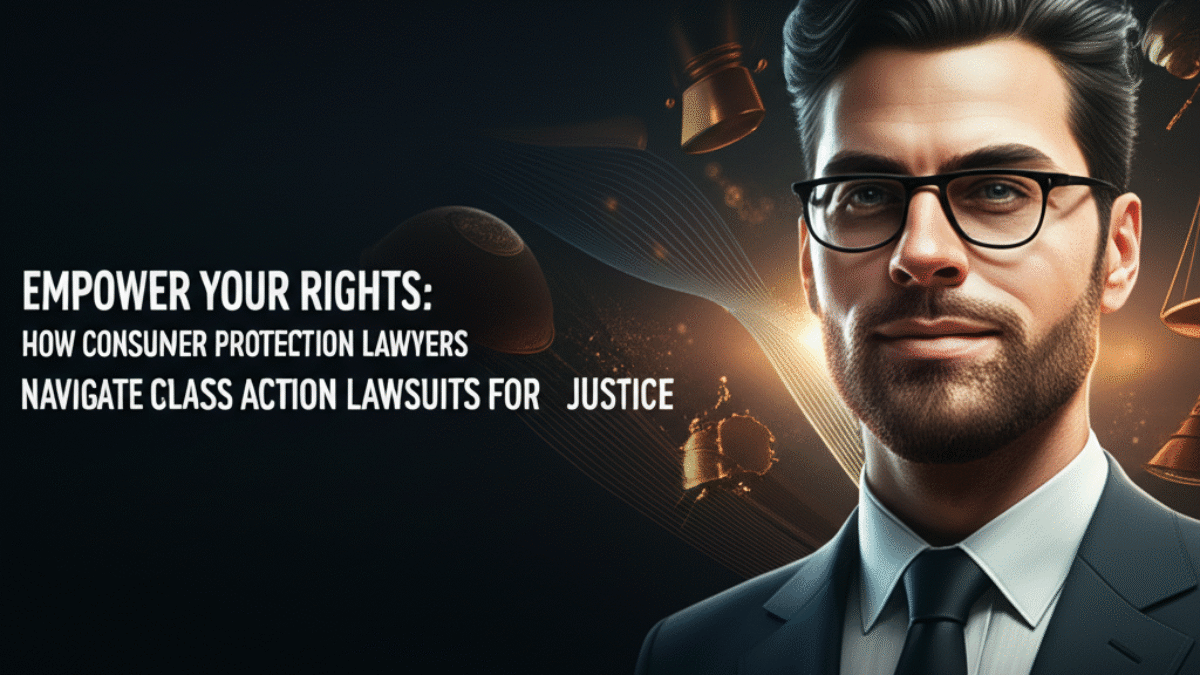Empower Your Rights: How Consumer Protection Lawyers Navigate Class Action Lawsuits for Justice
Imagine you’ve been wronged by a large corporation, perhaps through deceptive advertising, faulty products, or unfair practices that have affected not just you, but thousands of others. What do you do? This is where consumer protection lawyers come into play, particularly within the realm of class action lawsuits. These legal warriors fight for justice on behalf of consumers who have been collectively harmed. In this article, we’ll dive deep into how these attorneys navigate the complex world of class action lawsuits, empowering your rights as a consumer and ensuring corporate accountability.
The world of consumer rights can often feel overwhelming, especially when it involves powerful corporations. However, with the assistance of experienced consumer protection lawyers, you can stand up against unjust practices and seek the justice you deserve. In this article, we’ll explore the ins and outs of class action lawsuits, the role of consumer protection lawyers, and how you can benefit from these legal actions. We’ll also provide practical insights and real-world examples to make the process easier to understand.
Here’s what you can expect to learn:
- Understanding Class Action Lawsuits: What they are and how they work.
- Key Components: The essential elements that define a class action lawsuit.
- Benefits and Importance: Why class actions are crucial for consumer protection.
- Practical Applications: Real-world examples of successful class action lawsuits.
- Frequently Asked Questions: Answers to common queries regarding consumer rights and class actions.
Understanding Class Action Lawsuits
A class action lawsuit is a legal procedure that enables a group of people to collectively bring a claim to court. This is particularly useful when individual claims may be too small to warrant separate legal action, but when combined, they represent a significant issue. Think of it like a team of superheroes banding together to fight a common villain—in this case, a corporation that has harmed them.
What Constitutes a Class Action Lawsuit?
To qualify as a class action, several criteria must be met:
- Commonality: The issues at hand must be common to all class members.
- Numerosity: There must be enough individuals affected that joining them all in one lawsuit is practical.
- Typicality: The claims or defenses of the representative parties must be typical of those of the class.
- Representativeness: The representative parties must adequately protect the interests of the class.
The primary benefit of a class action lawsuit is efficiency. Rather than thousands of individual lawsuits clogging the court system, one lawsuit can resolve the issues for everyone involved. This not only saves time and resources but also amplifies the voice of consumers who may otherwise feel powerless against large corporations.
Key Components of Class Action Lawsuits
Every class action lawsuit is built on a few key components that ensure its effectiveness. Understanding these components can empower you as a consumer and prepare you if you ever find yourself in a situation requiring legal action.
The Role of Consumer Protection Lawyers
Consumer protection lawyers are the champions of justice in these cases. Their primary responsibilities include:
- Investigation: They gather evidence and assess whether a class action lawsuit is appropriate.
- Filing the Suit: Once a case is established, they file the necessary documents with the court.
- Representation: They represent the class members throughout the litigation process, negotiating settlements and presenting arguments in court.
- Communication: Keeping class members informed about the case status and any developments.
Types of Claims in Class Action Lawsuits
Class action lawsuits can cover a wide range of claims, including:
- Consumer Fraud: Deceptive business practices or false advertising.
- Product Liability: Claims related to defective or unsafe products.
- Discrimination: Cases involving employment discrimination or civil rights violations.
- Privacy Violations: Issues related to the unauthorized use of personal information.
Benefits and Importance
Class action lawsuits serve a vital function in our legal system, especially in consumer protection. Here are some of the key benefits:
Access to Justice
For many individuals, pursuing legal action on their own can be daunting and expensive. Class action lawsuits provide a way for consumers to band together and share the costs of litigation, making justice more accessible.
Deterrence of Corporate Malfeasance
When corporations face the threat of class action lawsuits, they are often more inclined to adhere to ethical standards and regulations. The fear of significant financial penalties can deter companies from engaging in deceptive or harmful practices.
Efficient Resolution
Class actions streamline the legal process, allowing courts to handle numerous claims in a single case. This efficiency can lead to faster resolutions for consumers, as opposed to lengthy individual lawsuits.
Practical Applications
Let’s take a look at some real-world examples of successful class action lawsuits to illustrate how they work and their impact on consumers.
Case Study 1: The Volkswagen Emissions Scandal
In one of the largest class action lawsuits in history, Volkswagen was sued for installing software in their diesel vehicles that manipulated emissions tests. This deception affected millions of consumers who purchased these vehicles under false pretenses. The lawsuit resulted in a multi-billion dollar settlement that provided compensation to affected consumers and mandated changes in Volkswagen’s business practices.
Case Study 2: The Equifax Data Breach
After a massive data breach exposed the personal information of over 147 million consumers, Equifax faced a class action lawsuit. The settlement provided affected individuals with credit monitoring services and financial compensation. This case highlighted the importance of corporate responsibility regarding consumer data protection.
Frequently Asked Questions
What is a class action lawsuit?
A class action lawsuit is a legal action taken by a group of people collectively against a defendant, usually a corporation, for common damages. Instead of each individual filing a separate lawsuit, they come together to seek justice and compensation as a group. This process makes legal action more efficient and accessible for consumers.
How do I know if I can join a class action lawsuit?
If you believe you have been harmed in a similar way to a group of individuals already participating in a class action, you may be eligible to join. It’s crucial to consult with a consumer protection lawyer who can assess your situation and inform you about your rights and options.
What are the costs associated with a class action lawsuit?
One of the advantages of class action lawsuits is that they are typically funded by the lawyers involved, often working on a contingency basis. This means that consumers do not pay upfront legal fees; instead, attorneys receive a percentage of any settlement or award. However, it’s essential to understand the fee structure before joining.
Can I opt-out of a class action lawsuit?
Yes, individuals have the right to opt-out of a class action lawsuit if they prefer to pursue their own legal action. However, opting out means you will not benefit from any settlement reached in the class action. It’s advisable to discuss your options with a lawyer before making this decision.
What happens if a class action lawsuit is successful?
If a class action lawsuit is successful, the court will typically approve a settlement or award damages to the affected class members. Depending on the case, compensation can include financial restitution, changes in corporate practices, or other remedies aimed at addressing the harm caused. The funds are then distributed among the class members as determined by the court.
Conclusion
Class action lawsuits are a powerful tool for consumers seeking justice against corporations that engage in unfair or deceptive practices. With the guidance of skilled consumer protection lawyers, individuals can unite to hold these entities accountable, ensuring that their rights are upheld. Understanding how these legal processes work not only empowers you as a consumer but also fosters a sense of community and collective action against wrongdoing.
As you navigate the complexities of consumer rights, remember that you are not alone. Whether you are considering joining a class action lawsuit or simply looking to learn more about your rights, the information and resources available can guide you toward making informed decisions. So, stay informed, seek out legal advice when necessary, and always advocate for your rights. Together, we can foster a fair and just marketplace for everyone.


